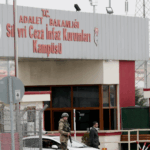A sprawling digital forgery scandal has sent shockwaves across Turkey, exposing deep cracks in the country’s electronic governance system and triggering fierce political condemnation. What began as an investigation into forged diplomas has ballooned into what opposition leaders now call the most serious institutional breach of the digital age in modern Turkish history.
At the center of the scandal is a 35-member criminal network accused of cloning the electronic signatures of senior public officials to access and manipulate secure government platforms. These stolen credentials were allegedly used to forge official diplomas, professional licenses, driver’s permits, and even to fabricate employment records in sensitive government departments — including the police narcotics division and engineering roles in state infrastructure projects.
Two separate indictments have been filed so far, implicating more than 220 suspects, while opposition parties warn that the full extent of the damage likely reaches further — deep into ministries, universities, and civil service ranks.
CHP’s Özgür Özel: ‘They Gave Diplomas to Ghosts While Real Candidates Took Their Own Lives’
During a rally in Tuzla, Republican People’s Party (CHP) leader Özgür Özel delivered a scathing rebuke of the Erdoğan government’s handling of the crisis. “This regime,” he said, “sat on this scandal for nine months while parading opposition mayors in handcuffs for symbolic offenses.”
Özel referenced the case of a convicted drug trafficker who allegedly gained access to police databases using the stolen digital ID of a chief officer — then was officially recorded as an officer in the narcotics unit.
He also drew attention to the tragedy of hundreds of qualified teacher candidates, many of whom failed to secure state appointments despite passing merit-based exams. “At least 300 educators ended their lives in despair,” he claimed. “While that happened, others were buying diplomas for 250,000 lira and walking straight into public jobs.”
DEM Party: ‘Institutional Collapse is No Longer Theoretical — It’s Measurable’
On the legislative front, the Peoples’ Equality and Democracy Party (DEM) submitted a motion for a full parliamentary inquiry, demanding transparency into both the criminal operation and the digital vulnerabilities that allowed it.
MPs Beritan Güneş Altın and Zeki İrmez warned that the breach goes beyond isolated fraud — it exposes the hollowing out of state institutions under the Erdoğan presidency. They emphasized that forged diplomas were reportedly used in major construction tenders, raising serious questions about public safety and engineering malpractice in national infrastructure.
DEM lawmakers also echoed growing public concern over whether the judiciary can be trusted to handle such a politically sensitive case. “When the courts are extensions of political will, justice becomes selective,” they stated.
Ali Babacan: ‘Turkey’s Digital Identity Has Been Compromised’
DEVA Party leader Ali Babacan, once Erdoğan’s top economy minister, described the crisis as a systemic failure of the state’s digital governance.
In an appearance on Halk TV, Babacan revealed that it wasn’t just diplomas being faked — personal data, including identity numbers, addresses, and health records, had likely been trafficked or sold. “We are not just looking at forgeries,” he said. “We are witnessing the complete failure to safeguard the digital DNA of the Republic.”
He criticized the government’s refusal to accept responsibility: “In a functioning democracy, such a scandal would lead to a wave of high-level resignations. But in Turkey, the system is so centralized that no one is held accountable. Everything flows from a single man in a 1,200-room palace — and the rest of the system has atrophied.”
Ministry Deflects — But Fails to Restore Confidence
Deputy Minister of Transport and Infrastructure Ömer Fatih Sayan, whose ministry oversees parts of the country’s e-signature infrastructure, defended the government’s response. He claimed that authorities revoked 44 forged e-signatures and suspended in-person e-signature issuance, while insisting the scandal had been under active investigation since early 2024.
Yet Sayan himself came under scrutiny after allegations surfaced about the authenticity of his own academic diplomas. He dismissed the accusations as “malicious,” but critics saw it as another sign that the rot might go deeper than the government admits.
Meanwhile, Turkey’s Council of Higher Education (YÖK) filed a criminal complaint against those alleging that 400 academics were implicated. YÖK called the accusations defamatory, but many interpreted the move as an attempt to silence whistleblowers, not address the substance of the claims.
Ümit Özdağ: ‘The State’s Nervous System Has Been Hijacked’
Even far-right Victory Party leader Ümit Özdağ, typically aligned with law-and-order narratives, sounded the alarm. “This isn’t just cybercrime,” he warned. “It’s a coordinated infiltration of the state’s central nervous system — from public tenders to personnel files.”
He described the attack as targeting the capillaries of the Republic, warning that if such access was possible for a domestic gang, foreign intelligence services could exploit the same vulnerabilities.
Behind the Scandal: A System Designed for Failure?
Investigative reports have revealed that some digital forgeries were linked to e-signature providers like TÜRKTRUST and E-IMZATR, where identity verification mechanisms were deeply flawed. The gang reportedly even used the identities of earthquake victims, deleting their records and replacing them with false ones to generate valid-looking credentials.
Payments for fake diplomas reportedly ranged from 250,000 to 2.5 million lira, with some transactions conducted via cryptocurrency. Forged driver’s licenses were sold for as little as 50,000 lira, sometimes issued to illiterate buyers. In one case, the digital record of a descendant of an Ottoman sultan was altered to reflect a university degree.
The Real Crime Is Institutional Erosion
This scandal is not simply about forged documents — it’s about the erosion of institutional legitimacy in an already fragile democracy. The ease with which the state’s digital gateways were compromised suggests more than technical lapses — it points to the abandonment of oversight, the politicization of regulatory bodies, and the centralization of power to the point where no one is held accountable.



